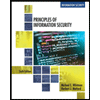1) Create one original illogical argument (fallacy) that could be used in a false attempt to manipulate another into believing cheating is okay. Name and Define the fallacy you are using. If you use a subset of a fallacy define the subset. Provide the example that fits that fallacy Bold print the name of the fallacy. It should look like this: Fallacy and Definition - 2 Wrongs make a Right - Faulty reasoning believing that it is right to do something since someone else did the same. Jack after cheating on the test stated, "Of course, it's okay to cheat, Jill does it all the time".
Illogical argument:
An illogical argument is a statement or set of statements that do not follow logical principles or lacks evidence to back it up. It may be based on false premises, or involve contradictions or incorrect assumptions. Examples of illogical arguments include circular reasoning, false dichotomies, non-sequiturs, and appeals to emotion. Circular reasoning is when a conclusion is reached by repeating the same premise or idea in various forms. False dichotomies are when two choices are presented as the only possible outcomes, when in fact there may be many more options. Non-sequiturs are statements that do not logically follow from what has previously been said. Finally, appeals to emotion are when an appeal is made to a person's feelings rather than to reason. All of these arguments are illogical and should be avoided.
Trending now
This is a popular solution!
Step by step
Solved in 2 steps


